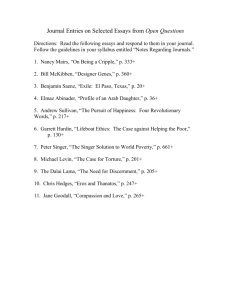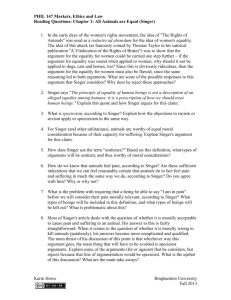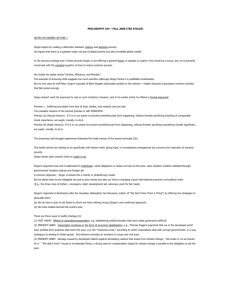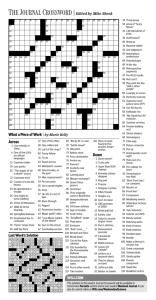R8, OneCommunity-H08
advertisement
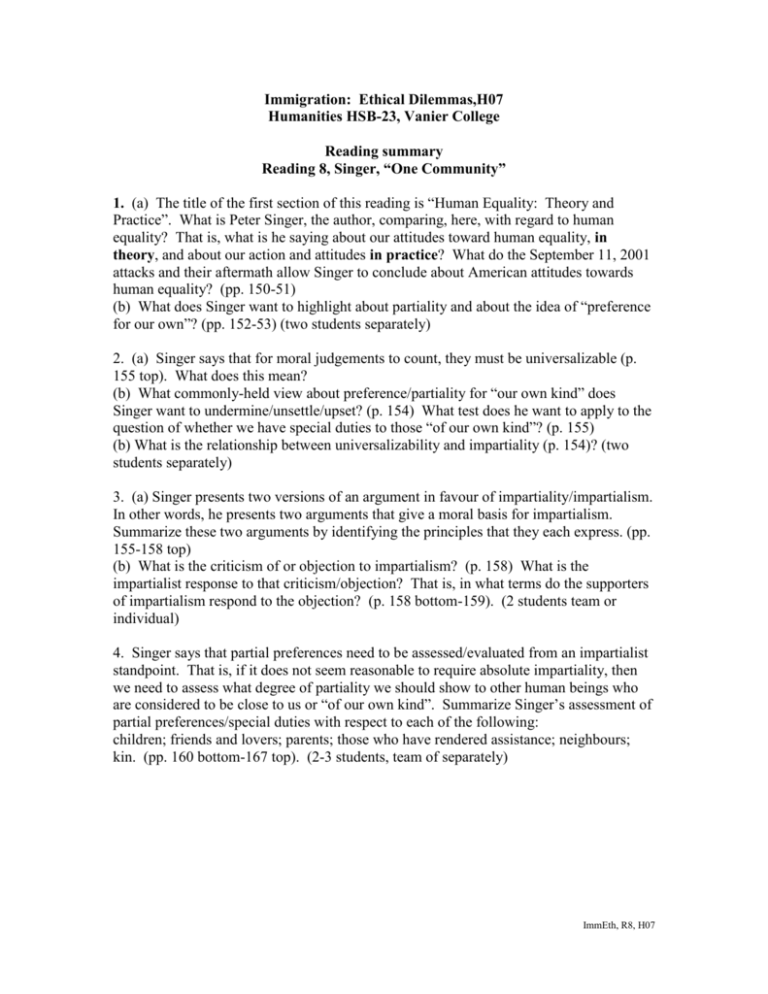
Immigration: Ethical Dilemmas,H07 Humanities HSB-23, Vanier College Reading summary Reading 8, Singer, “One Community” 1. (a) The title of the first section of this reading is “Human Equality: Theory and Practice”. What is Peter Singer, the author, comparing, here, with regard to human equality? That is, what is he saying about our attitudes toward human equality, in theory, and about our action and attitudes in practice? What do the September 11, 2001 attacks and their aftermath allow Singer to conclude about American attitudes towards human equality? (pp. 150-51) (b) What does Singer want to highlight about partiality and about the idea of “preference for our own”? (pp. 152-53) (two students separately) 2. (a) Singer says that for moral judgements to count, they must be universalizable (p. 155 top). What does this mean? (b) What commonly-held view about preference/partiality for “our own kind” does Singer want to undermine/unsettle/upset? (p. 154) What test does he want to apply to the question of whether we have special duties to those “of our own kind”? (p. 155) (b) What is the relationship between universalizability and impartiality (p. 154)? (two students separately) 3. (a) Singer presents two versions of an argument in favour of impartiality/impartialism. In other words, he presents two arguments that give a moral basis for impartialism. Summarize these two arguments by identifying the principles that they each express. (pp. 155-158 top) (b) What is the criticism of or objection to impartialism? (p. 158) What is the impartialist response to that criticism/objection? That is, in what terms do the supporters of impartialism respond to the objection? (p. 158 bottom-159). (2 students team or individual) 4. Singer says that partial preferences need to be assessed/evaluated from an impartialist standpoint. That is, if it does not seem reasonable to require absolute impartiality, then we need to assess what degree of partiality we should show to other human beings who are considered to be close to us or “of our own kind”. Summarize Singer’s assessment of partial preferences/special duties with respect to each of the following: children; friends and lovers; parents; those who have rendered assistance; neighbours; kin. (pp. 160 bottom-167 top). (2-3 students, team of separately) ImmEth, R8, H07 5. Are there impartial reasons for favouring one’s compatriots over foreigners; for favouring those who share our nationality over those who do not? (pp. 167-175) Answer by filling out the table below. (4 students in 2 teams) Favouring our compatriots/fellow citizens: arguments and counter-arguments Position or stance Line of argument Assertions/propositions in support of showing preference for our fellow nationals Counter-arguments/propositions to the stance in favour of preferences Extended kin argument Community of reciprocity argument Imagined community argument Efficiency of nations argument Justice and equality within the nation first, between second 6. (a) What is Singer’s assessment of the idea that the interests of one’s fellow citizens should override the interests of other people who are not one’s fellow citizens? (p. 180) (b) What does this assessment lead Singer to conclude about the commitment of the USA to foreign aid? (p. 180) (c) What are the facts of the foreign aid commitment of the USA? According to Singer, how do these facts compare to the attitude of Americans with the attitudes of Americans with respect to that commitment? (pp. 181-85) (2 students separately) 7. (a) Singer presents the case of Bob and his Bugatti to make an ethical point about our obligation to give to those worse off than ourselves, especially when we are living well. What does the case lead Singer to conclude about: (i) the morality of not sending money to international aid organizations if you can afford it (p. 188) (ii) the level or extent of sacrifice we should make with respect to the poor and disadvantaged. (p. 189) (b) What are the two objections to the argument that we (citizens of the well-off world) are bound ethically to donate more money to aid agencies? (pp. 190-192) (2 students separately) 8. How much should we (anyone with income to spare) give to organizations that work to help the world’s poorest people? Answer by summarizing the three propositions about giving. In what terms are these propositions justified? (pp. 193-95). (1-2 students) ImmEth, R8, H07
